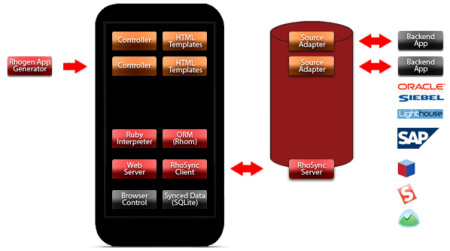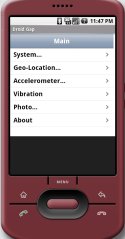Open-source mobile framework supports Android
Mar 26, 2009 — by Eric Brown — from the LinuxDevices Archive — views A startup called Rhomobile announced the first formal release of its dual-licensed, open-source framework for smartphones. Rhodes 1.0 enables “write-once” development, using HTML and Ruby, of native smartphone applications for iPhone, BlackBerry, Windows Mobile, Symbian, and now Android, the… company says.
A startup called Rhomobile announced the first formal release of its dual-licensed, open-source framework for smartphones. Rhodes 1.0 enables “write-once” development, using HTML and Ruby, of native smartphone applications for iPhone, BlackBerry, Windows Mobile, Symbian, and now Android, the… company says.
(Click for larger view of Rhodes sample app running on an iPhone)
Rhodes reduces development costs by “up to five times” by eliminating the need to develop similar applications for each mobile operating system (OS), and by using HTML instead of “diverse and complex native device OS languages,” claims Rhomobile. The Rhodes framework supports commonly implemented smartphone capabilities such as GPS, PIM data, and camera functionality, says the company. The Android support was added in time for the final release, adds Rhomobile.
Modeled in part on the open-source Ruby on Rails framework, Rhodes is said to be especially suitable for interaction with hosted enterprise application (SaaS) backends, such as CRM and ERP. Billed as taking up about 2MB on a mobile device, Rhodes enables users to work offline with synchronized local data via a local database such as SQLite or DB40, and it can also work with a generic backend synchronization framework such as its own open-source RhoSync software (see diagram below). Rhodes combines an HTML coding framework with a Ruby interpreter, and is claimed to be the first Ruby implementation on any of the five supported platforms.

Rhodes architecture
(Click to enlarge)
Rhodes is said to combine the following components:
- Ruby implementation (minimalist) to run on mobile devices
- Model-View-Controller “microframework” with directory structure and file naming convention, written to by editing a set of ERB templates for creating HTML
- RhoGen application generator for generating a basic Create-Read-Update-Delete controller and associated views for specified data objects
- RhoSync synchronization engine client
- Rhom simple object relational manager (ORM)
- Web server, which is installed on the mobile device and runs locally
Stated Adam Blum, CEO of Rhomobile, “Whether you are an enterprise developer who wants to tap into the power of today's smartphones for the mobile workforce or an entrepreneur who wants to build software for app stores, our Rhodes framework provides unparalleled ease-of-use and efficiency, allowing developers to build powerful mobile applications with about ten percent of the code used in apps today.”
 PhoneGap app running on Android emulator (Click to enlarge) |
PhoneGap does it with JavaScript
A somewhat similar “write once, run anywhere” product, without all the back-end server support, is offered by a startup called Nitobi, Inc. Like Rhodes, Nitobi's PhoneGap devlopment platform is open-source and it supports Android. The other two currently supported platforms are the BlackBerry and iPhone.
Aimed primarily at iPhone developers who don't want to learn the iPhone's Objective-C (the language in which PhoneGap is written), the technology depends on HTML and JavaScript for cross-platform development, and supports a variety of JavaScript frameworks. It also incorporates the WebKit browser for integrating web applications inside native applications.
The Android version currently supports geolocation, vibration, and accelerometer functions, with sound and contact support pending. Over a dozen PhoneGap apps have been written, including games, geolocation apps, and for New Yorkers, a “Coovents” happy hour locator.
In a recent story from our sister publication, eWEEK, writer Darryl Taft quotes Nitobi CEO Andre Charland as saying, “With PhoneGap today, just from JavaScript you can get access to geo-location, accelerometer, vibration, access to photos, contacts, offline storage and more features coming out. Most developers have been exposed to HTML and JavaScript, and anyone can build a Web site — it's the same idea with PhoneGap.”
Availability
Rhodes is available now, with “flexible pricing options,” including dual licensing under GPLv3 for open-source apps and commercial licensing options for enterprises and ISVs, says Rhomobile. The download page should be here, and more information on the technology behind Rhodes may be found here.
More information on PhoneGap may be found here. The eWEEK story, “PhoneGap Simplifies iPhone, Android, BlackBerry Development,” may be found here.
This article was originally published on LinuxDevices.com and has been donated to the open source community by QuinStreet Inc. Please visit LinuxToday.com for up-to-date news and articles about Linux and open source.